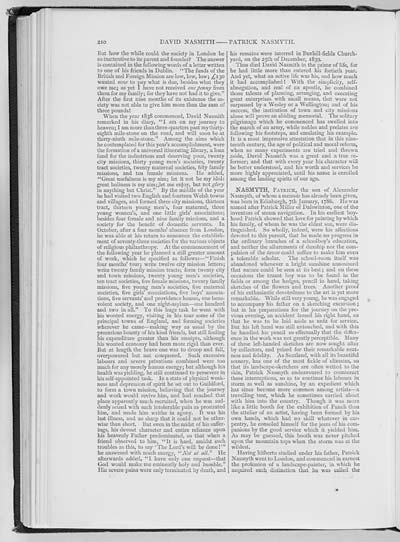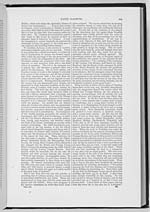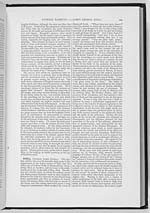2IO
But how the while could the society in London be
so inattentive to its parent and founder? The answer
is contained in the following words of a letter written
to one of his friends in Dublin. "The funds of the
British and Foreign Mission are low, low, low; �130
wanted now to pay what is due, besides what they
owe me; as yet I have not received one penny from
them for my family; for they have not had it to give."
After the first nine months of its existence the so-
ciety was not able to give him more than the sum of
three pounds!
When the year 1838 commenced, David Nasmith
remarked in his diary, "I am on my journey to
heaven; I am more than three-quarters past mythirty-
eighth mile-stone on the road, and will soon be at
thirty-ninth mile-stone." Among the aims which
he contemplated for this year's accomplishment, were
the formation of a universal itinerating library, a loan
fund for the industrious and deserving poor, twenty
city missions, thirty young men's societies, twenty
tract societies, twenty maternal societies, fifty family
missions, and ten female missions. He added,
"Great usefulness is my aim; let it not be my idol:
great holiness is my aim; let me enjoy, but not glory
in anything but Christ." By the middle of the year
he had visited two English and fourteen Welsh towns
and villages, and formed three city missions, thirteen
tract, thirteen young men's, four maternal, three
young women's, and one little girls' associations;
besides four female and nine family missions, and a
society for the benefit of domestic servants. In
October, after a four months' absence from London,
he was able at his return to announce the establish-
ment of seventy-three societies for the various objects
of religious philanthropy. At the commencement of
the following year he planned a still greater amount
of work, which he specified as follows:�"Finish
four months' tour; write twelve city mission letters;
write twenty family mission tracts; form twenty city
and town missions, twenty young men's societies,
ten tract societies, five female missions, twenty family
missions, five young men's societies, five maternal
societies, five girls' associations, five boys' associa-
tions, five servants' and providence houses, one bene-
volent society, and one night-asylum�one hundred
and two in all." To this huge task he went with
his wonted energy, visiting in his tour some of the
principal towns of England, and forming societies
wherever he came�making way as usual by the
precarious bounty of his kind friends, but still finding
his expenditure greater than his receipts, although
his wonted economy had been more rigid than ever.
But at length the brave one was to droop and fall,
overpowered but not conquered. Such excessive
labours and severe privations combined were too
much for any merely human energy; but although his
health was yielding, he still continued to persevere in
his self-appointed task. In a state of physical weak-
ness and depression of spirit he set out to Guildford,
to form a town mission, believing that the journey
and work would revive him, and had reached that
place apparently much recruited, when he was sud-
denly seized with such intolerable pain as prostrated
him, and made him writhe in agony. It was his
last illness, and so sharp that it could not be other-
wise than short. But even in the midst of his suffer-
ings, his devout character and entire reliance upon
his heavenly Father predominated, so that when a
friend observed to him, "It is hard, amidst such
troubles as this, to say 'The Lord's will be done!'"
he answered with much energy, "Not at all" He
afterwards added, "I have only one request�that
God. would make me eminently holy and humble."
His severe pains were only terminated by death, and
his remains were interred in Bunhill-fields Church-
yard, on the 25th of December, 1839.
Thus died David Nasmith in the prime of life, for
he had little more than entered his fortieth year.
And yet, what an active life was his, and how much
it had accomplished! With the simplicity, self-
abnegation, and zeal of an apostle, he combined
those talents of planning, arranging, and executing
great enterprises with small means, that were not
surpassed by a Wesley or a Wellington; and of his
success, the institution of town and city missions
alone will prove an abiding memorial. The solitary
pilgrimage which he commenced has swelled into-
the march of an army, while nobles and prelates are
following his footsteps, and emulating his example.
It is a most impressive attestation that in this nine-
teenth century, the age of political and moral reform,
when so many experiments are tried and thrown,
aside, David Nasmith was a great and a true re-
former; and that with every year his character will
be better understood, and his worth and services be
more highly appreciated, until his name is enrolled
among the leading spirits of our age.
NASMYTH, PATRICK, the son of Alexander
Nasmyth, of whom a memoir has already been given,
was born in Edinburgh, 7th January, 1786. He was
named after Patrick Miller of Dalswinton, one of the
inventors of steam navigation. In his earliest boy-
hood Patrick showed that love for painting by which
his family, of whom he was the eldest son, were dis-
tinguished. So wholly, indeed, were his affections
devoted to this pursuit, that he made no progress in
the ordinary branches of a schoolboy's education,
and neither the allurements of duxship nor the com-
pulsion of the tawse could suffice to make him even
a tolerable scholar. The school-room itself was
abandoned whenever a bright sunshine announced
that nature could be seen at its best; and on these
occasions the truant boy was to be found in the
fields or among the hedges, pencil in hand, taking
sketches of the flowers and trees. Another proof
of his enthusiastic devotedness to the art is yet more
remarkable. While still very young, he was engaged
to accompany his father on a sketching excursion ;
but in his preparations for the journey on the pre-
vious evening, an accident lamed his right hand, so
that he was to be laid aside as unfit for service.
But his left hand was still untouched, and with this
he handled his pencil so effectually that the differ-
ence in the work was not greatly perceptible. Many
of these left-handed sketches are now sought after
by collectors, and prized for their remarkable neat-
ness and fidelity. As Scotland, with all its beautiful
scenery, has one of the most fickle of climates, so
that its landscape-sketchers are often wetted to the
skin, Patrick Nasmyth endeavoured to counteract
these interruptions, so as to continue his labours in
storm as well as sunshine, by an expedient which
has since become more common among artists�a
travelling tent, which he sometimes carried about
with him into the country. Though it was more
like a little booth for the exhibition of Punch than
the attelier of an artist, having been formed by his
own hands, which had no skill whatever in car-
pentry, he consoled himself for the jeers of his com-
panions by the good service which it yielded him.
As may be guessed, this booth was never pitched
upon the mountain tops when the storm was at the
wildest.
Having hitherto studied under his father, Patrick
Nasmyth went to London, and commenced in earnest
the profession of a landscape-painter, in which he
acquired such, distinction that he was called the

![]() Universal Viewer |
Universal Viewer | ![]() Mirador |
Large image | Transcription
Mirador |
Large image | Transcription
![]()

